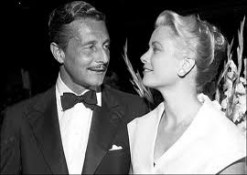
August 19, 2010

Gstaad. An article in Vanity Fair about a man I knew for over forty years has turned me into Orlando Furioso. Oleg Cassini died in 2006 well into his nineties. We met in 1956 on an airplane going to Bermuda to play a tennis tournament. Cassini was a good club player and a so-so skier, back in the days few people skied. He was a heterosexual dress designer who designed very ugly clothes for women and even worse ones for men. Women, however, had made Oleg famous in an age when people were celebrated for proper reasons. He first married Gene Tierney, the beautiful sloe-eyed star ofLaura, in the forties, then romanced Grace Kelly during the fifties, losing her to Rainier, a loss he took very badly and talked about often in the years to come. He hit the big time when Jackie Kennedy picked him as her favorite American designer when the Irish clan took over the White House in January 1961.
What about his ugly designs, you might ask. Jackie was a clotheshorse and knew the great European designers. Well, the orders had come from above, JFK himself, because Oleg was an American, and, more important, pimped for the young president. Oleg and his brother Igor, known as Ghighi, were Italians who had come over to America claiming noble Russian and Italian blood. Although they’re not around to defend themselves, I’ve always believed their title to be a bogus one, as well as their name Cassini. Mind you, it’s not important. What is extremely important is that Oleg had one daughter with Gene Tierney, Tina, who is now fighting for her share of the large fortune he left, a fortune claimed by a woman he spent the last 30 years of his life with. (Oleg had another daughter with Tierney, Daria, who was born severely retarded and nearly blind.)
And here is where I wish the writer of the VF piece had contacted me. I happened to be present when Oleg met Marianne Nestor back in 1968, in Sardinia. Nestor is an American whose origins are Greek. She now claims to have been married to Cassini but I personally never heard him refer to her as his wife, nor has she come up with proof that a marriage took place. What I do remember very well is that Oleg had warned me a couple of times to stay away from Tina, who was cute but very shy. “She’s my daughter and the last thing she needs is someone like you, so keep away,” or words to that effect. At present la Nestor is charging that Tina was not Oleg’s daughter, an outrageous calumny that could be leveled at all of us. Again, it’s the first time I hear of it. Tina has three children by an Italian who lived off her tiny income provided by Oleg for thirty years, has had cancer, and now has to defend herself in court and prove she is her father’s daughter. Talk about unbridled greed and shyster lawyers.
Oleg and I had a strained relationship. I was much closer to Ghighi. Oleg used to punch first in nightclubs, mostly those who were lovers, not fighters. I thought it cowardly. He and I never had a fight, but had plenty of words. He once invited me to the White House for dinner. Although I was 26, I knew the score and refused the offer. Those ghastly Kennedys had heard of my first wife, the prettiest girl in Paris, and thought I’d offer her in exchange for a lousy White House dinner among Irish ruffians. I told Oleg he should be ashamed of himself and he called me a few choice names too.
The VF piece describes Cassini as a legendary seducer. Once again I’m not so sure. Legendary seducers go for all kinds of women, just look at Don Giovanni. Chamber maids, countesses, married ladies, everything. Oleg certainly had lots of success with the fairer sex, but mostly with names. I never saw him with a sweet young thing, models and stars mostly. American society ladies back then—I’m talking about the fifties and sixties—perceived him as somewhat greasy, a foreigner with an accent and a mustache. A Pepe Le Moco type of figure. In his 1987 autobiography, Oleg never mentioned Marianne Nestor, a somewhat strange omission even for a male chauvinist pig like Oleg, or me, for that matter. One has to mention the wife, even if it kills one.
What I am hoping for is that Tina gets what’s coming to her. She has had a very sad life. Looking back she would have had an easier ride with the poor little Greek boy. The trouble is that people live far too long, and once they’re really old, like in their mid-eighties, they start being extremely vulnerable to manipulation by interested parties. I’ve made my will and will only change it in case the deputy editor of the Spectator finally shows up at our next wedding date. Otherwise it all goes to the mother of my children and my two kids. Oleg was extremely negligent not to have made an iron-clad will. Especially as he was in his nineties. What the hell did he expect? To live until 140? Anyway, it was a good piece that brought back too many memories of characters I knew only too well.